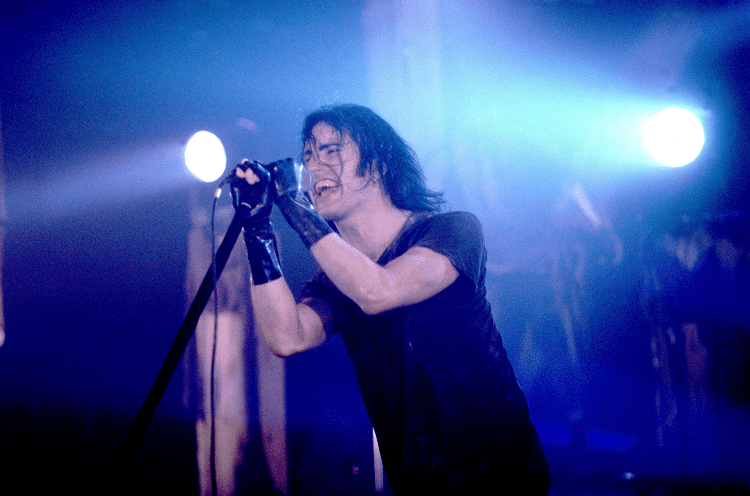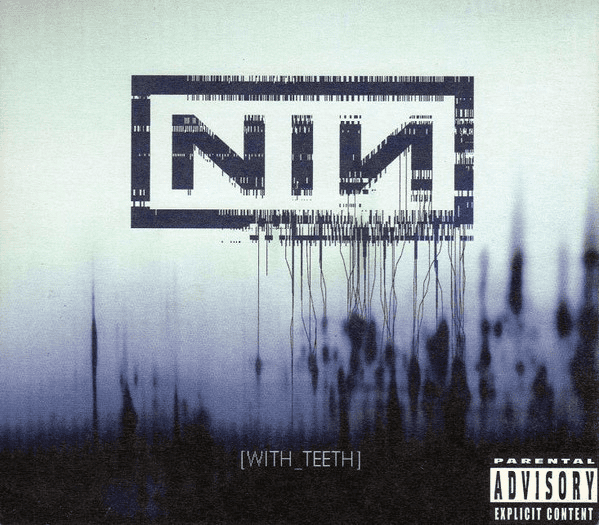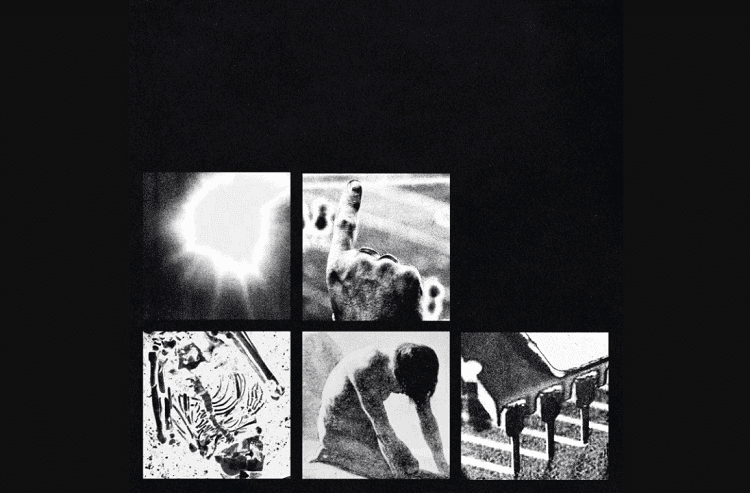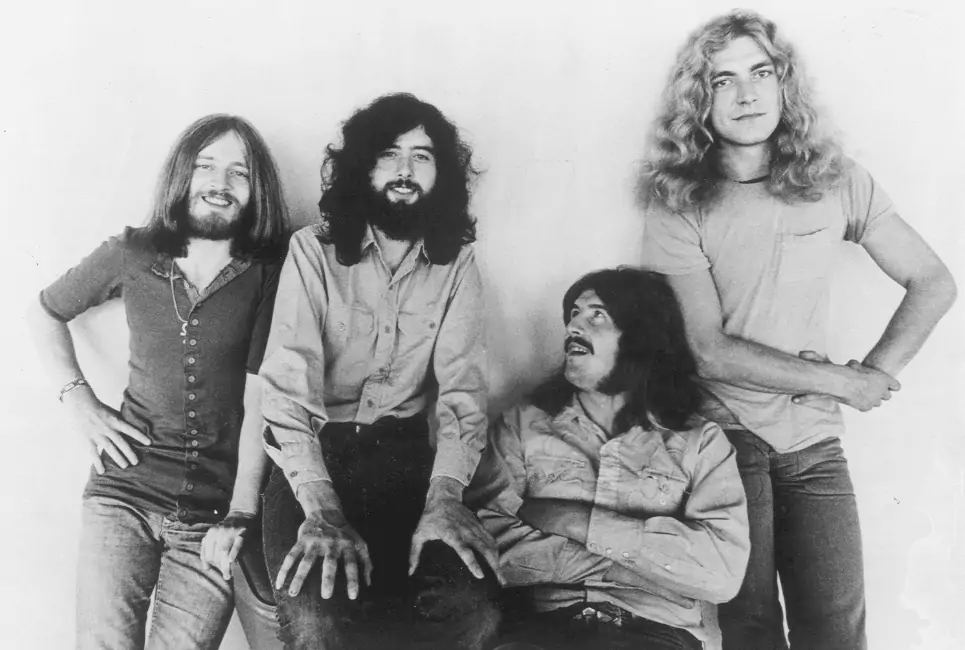- 10 Best Rock Trios of the 2000s - February 2, 2024
- Elvis Costello Bio - August 19, 2022
- The Byrds Band History: Were They Really America’s Answer to the Beatles? - August 10, 2022
- Early Years
- Pretty Hate Machine
- Living and Recording
- The Downward Spiral
- Nine Inch Nails Tours Go Crazy
- The Fragile
- Addictions Take Hold
- Johnny Cash Does Hurt
- With Teeth
- Year Zero
- Ghosts I-IV
- The Slip
- Hesitation Marks
- The Trilogy
- Bad Witch
- Ghosts V-VI and The Rock and Roll Hall of Fame
- Producing Halsey
- Recent Material and New Tours
- Musical Style
- Legacy
- FAQs
The 1990s are one of the most interesting times in all of music. Innovation was at an all-time high, and the rock genre, in particular, was seeing a total evolution, with grunge happening at the forefront of it all.
It was during this time that Nine Inch Nails hit it big, offering respite from the onslaught of grunge bands starting to come out and instead of offering the world something very, very different.
To say Nine Inch Nails is a unique band just doesn’t do it justice. Some people call them industrial rock, but even that is inaccurate because Trent Reznor’s brainchild is something of its own genre. It has elements of all different kinds of rock, but it never ends up sounding like anything else.
The sounds that come out of the songs from this band are just simply in a class of their own, and listening to any of the numerous records they’ve put out over the years will clue you into just what I mean.
Trent Reznor is one of the most relevant names in the world of music today, but to get here, the path was a long and winding one filled with the usual pitfalls and bumpy roads that accompany a life in the spotlight. This is the history of one of the most important bands in the last 3 decades, Nine Inch Nails.
Early Years
Like many bands of the 1990s, Nine Inch Nails formed in the late 1980s, as hair metal was reigning supreme. Trent Reznor happened to be playing in a band in Cleveland, though this band, Exotic Birds, was not what he was looking for, and he needed to find a group that could play the material he wrote.
Most would-be rockstars eventually find that band, but for Trent Reznor, he quickly realized that this band didn’t exist, and instead, he was going to have to do the work himself. Inspired by Prince, Trent decided to play all the instruments in the band himself besides drums which he created with an electronic drum machine, a sound that is pervasive in all of Nine Inch Nails records.
He created the name Nine Inch Nails and had his first show as part of the Pretty Hate Machine Tour series. He hadn’t released a single recording yet, but he started getting some seriously big interest from his performances and, from there, released the first Nine Inch Nails album, Pretty Hate Machine.
Nine Inch Nails came to Trent Reznor simply for the easy ability to abbreviate it. Critics assumed there was a religious aspect to the name, but Trent has refuted this throughout the years.
Pretty Hate Machine
Trent Reznor saw his first lead single, “Down in it.” get relatively positive press but was yet to sign any big deals. He wanted to make sure that he had full control over the product, and at the time, that was a hard thing to guarantee. The biggest single of the album came in the form of “Head Like A Hole.”, which was a raucous punk fueled song with a melody you might find on a pop song, which was just a truly bizarre combination that the music world wasn’t quite ready for.
Additional band members would be Sean Beaven, who actually mixed the demos of Pretty Hate Machine on backup vocals, though Trent Reznor would continue to perform most of the instruments himself.
The video for the song “Down in it.” actually attracted the attention of the FBI after the final part of the video implied that Trent Reznor had fallen off a building and died.
During the tour for the band’s first album in 1990, Trent Reznor began to smash equipment on stage. This wasn’t anything new for the rock world, but it quickly stirred their fans into a frenzy with the highly aggressive nature of the act, and it worked to fuel their status as an energetic and in-your-face kind of band.
Broken
The early 1990s began to flood with grunge music, and it was tough for any band to carve out an audience at this point in time. Interestingly enough, Nine Inch Nails was booked to open for Guns N’ Roses during their tour for their Use Your Illusion I and II albums, and the reception was far from ideal.
They were forcing a band that was nothing like Guns N’ Roses to open, and the crowds were just not at all into the experimental style Nine Inch Nails had to offer.
This lack of understanding by their label as to what kind of band Nine Inch Nails was caused Trent Reznor to demand his label terminate the contract with Nine Inch Nails. Interscope Records would not agree to it, seeing too much potential in the band, so in turn, Trent Reznor would start recording in secret using different names to keep Interscope from getting involved.
Eventually, Jimmy Iovine and Interscope Records got on board with what Trent was going for and gave him the support that he needed to record the follow-up album. That album would be recorded in the house where the Manson family murders took place. As bizarre of a choice this was, it upped the intrigue for their followup to Pretty Hate Machine, and Broken was released to a top 10 status for the first time in the band’s career.
Broken was a much heavier record, leaving pop sensibilities behind for hard-driving riffs with a much darker tone. The album got Nine Inch Nails its first two Grammy awards as well.
Living and Recording
Trent Reznor saw the success that Broken was having and decided to go with an “if it ain’t broke, don’t fix it” approach, which led to him remaining in the house of the Manson murders to record a follow-up album to Broken, without being under any restrictions in terms of lyrics or musical direction from Interscope Records.
The Downward Spiral
Still hard at work in the mid-1990s in the Manson murder house, Trent Reznor was paying 11,000 per month to stay there while recording the next Nine Inch Nails album. Most artists would consider this insane as studios generally paid for the artists to get studio time, but Trent has always been unique, and this situation was not any different.
After months of recording, The Downward Spiral debuted at number 2 on the Billboard charts. This remains Nine Inch Nails’ best charting to this day.
Standouts from the record include “Closer,” one of the band’s most popular songs ever, which remains heavy on radio and streaming services today for its hypnotizing dirge of a chorus and catchy riffs.
The other most important song on the album was “Hurt,” which marked a decided departure from the majority of Nine Inch Nails material. The song was slower, almost ballad-like, without any of the hard, industrial-sounding guitars the band was known for. Although it wasn’t released as a single, it truly showed Trent Reznor’s incredible ability to write lyrics and melodies.
The song would go to be covered by Johnny Cash years later as one of the last songs he would perform before his death. Trent Reznor related the cover to watching someone date his girlfriend, though he fully embraced Johnny Cash’s version and appreciated an artist of that magnitude wanting to cover one of his songs.
The Downward Spiral is known as one of the greatest albums of all time, ranking 200th on Rolling Stone’s “The 500 Greatest Albums of All Time” list.
Nine Inch Nails Tours Go Crazy
Following the massive success of The Downward Spiral, the band would go on tour to support it. Trent Reznor played all the instruments on the records, but in live shows, he was supported by a host of revolving musicians. Despite that, each one knew the band’s image, and Nine Inch Nails shows would start to gain a reputation as some of the most over-the-top and insane shows out there.
Band members would cover themselves in corn starch and start fighting each other on stage, destroying equipment and diving into the crowds. This was all part of the act, though, as band members were revolving, and the conflicts on stage were simply to drive audiences wild, which they did consistently and still do to this day.
The Fragile
Although Trent Reznor had garnered the reputation as one of the industry’s most consistent and hardest working recording artists, the next Nine Inch Nails album would not arrive until 1999, making it 5 years since the release of The Downward Spiral.
The reasons for this involved many things, such as Reznor getting into making the soundtrack for films, such as David Lynch’s Lost Highway, as well as touring and recording a new single called “the Perfect Drug.”
It wasn’t all good things prolonging the release of the next album, though, as Trent Reznor, like many rockstars, battled addiction and being a perfectionist, couldn’t seem to create the material he wanted on the next album.
Reznor also famously faced large bouts of writer’s block, which fueled his addictions, and due to him being pretty much a one-man band, he was left to face these addictions on his own.
Thankfully, he emerged from his addictions on the winning side and released the double album Fragile in September of 1999. The album was released at number one on the Billboard 200, making it the highest-charting release in the band’s history.
Unfortunately, it would begin a steady drop, and although many of the songs became huge hits, such as “the Day the World Went Away and “Into the Void.”, Nine Inch Nails managed to set a record for the biggest drop in Billboard chart history.
Addictions Take Hold
Trent Reznor’s lyrics had painted the picture of a struggling addict for many years, but for the most part, his addictions were kept out of the public eye. Unfortunately, those addictions took hold one night during the Fragility 2.0 tour, and Reznor overdosed on heroin. Luckily, Trent would enter rehab shortly after.
Johnny Cash Does Hurt
As detailed earlier, the release of Johnny Cash’s cover of Hurt greatly affected Trent Reznor, but not in the negative way some might imagine.
His great respect for the man spurred him on to write new material, and for Reznor, it would be a long time coming as Fragile had been released in 1999, and it was 2002 at this point. Years would pass before the next album would release, but sure enough, it would happen.
With Teeth
After 6 long years filled with rehab, addiction, and more writer’s block, Trent Reznor would return with Nine Inch Nails with another strong effort titled With Teeth. It would debut again at the top of the Billboard 200, and this time, it would stay in the top 10 far longer than Fragile did.
Marking a first for the band, the entire album was made available on the band’s Myspace page ahead of its release date, which would be a precursor to where music would start going in the coming decades.
One of the biggest songs of the album was “Hand that Feeds,” which brought back the hard-driving industrial sound that appeared to be missing from Fragile. The song was famously released later on Garageband, allowing fans of the band to remix the song and send it to him.
Another important song off the album would be “Every Day is Exactly the Same,” which was an ode to being stuck in the same place day in and day out and has quite a lot of relevance in today’s world. There was a video planned for the song, but it never made it out of the post-production stage.
Year Zero
Trent Reznor was back at it following the successful release of With Teeth, and just two years later, the follow-up Year Zero would release. Unlike previous albums, Year Zero was a concept album that would tell a story. That story would take place in 2022, detailing a world in constant chaos with a corrupt government, rebel groups, and terrorist attacks happening all over.
It also involved the government dosing the public with a drug through the water supply. He wasn’t too far off with this wild sci-fi story, and it was eventually turned into an alternate reality game, where the internet could take part in playing all of the parts.
Year Zero wasn’t as critically successful as With Teeth, but it marked an interest in the storytelling genre for Trent Reznor, and over the next few years, he would meet with writers and eventually pitch the idea for a movie or TV show about the events that take place in Year Zero.
Reznor famously described it as writing a soundtrack for a movie that did not exist. Overall, the album had a good reception, with the single “Survivalism” as a high point.
The show Year Zero was actually picked up by HBO and got as far as the scriptwriting process before it was eventually thrown off track by the Writer’s Guild Strike of 2007, though it would be attempt to be resurrected one more time before falling apart completely.
Ghosts I-IV
Trent Reznor continued to take Nine Inch Nails in a different direction with Ghosts I-IV, which was a purely instrumental album consisting of 36 tracks, making it one of the biggest albums to ever be released. It was available on the band’s website rather than the normal physical release.
This would be the first album the band released independently, as their contract with Interscope Records was up. Fans of the band ate up this new release, and a $300 package of the various volumes were released, which sold out in merely 3 days.
The album is haunting in its musical composition, with wildly varying styles of songs that go everywhere from piano pieces to out there instruments like banjos and the like. One of the songs off the album would involve a short little western-sounding intro.
That intro would go on to be the entire riff of Lil Nas X’s “Old Town Road,” which is the biggest single in the history of music. Trent Reznor would be asked to appear in the music video for it but declined because he didn’t want to take away from Lil Nas X.
The Slip
Nine Inch Nails would release another album right after Ghosts, and this one would come with almost no advertising whatsoever. It was fully produced and released by Trent Reznor and managed to get to number 13 on the Billboard 200. Many critics viewed it as the best work Nine Inch Nails had done in a decade, applauding it for its musical versatility and inventiveness.
Trent Reznor would gain acclaim during this time for being one of the biggest artists to embrace the end of the CD era of music and instead becoming a presence digitally. The slip would get over 1.4 million downloads on the Nine Inch Nails site alongside its massive physical release.
Hesitation Marks
Trent Reznor would become one of the hottest commodities in the music industry again following The Slip, and in 2012, he would go back into the studio and went back on tour as well. Hesitation Marks was released in 2013, making it another 5 years since the band’s last release.
It reached number 3 on the Billboard charts, showing the band’s staying power while evolving its sound to something completely new while staying true to what the band has always been about. The album would be nominated for Best Alternative Music Album as well.
With the band at the height of its powers again, Nine Inch Nails embarked on several tours, including one with Soundgarden. The lineup on the tours would involve members from different bands such as Jane’s Addiction, and Nine Inch Nails would essentially become the gumbo of rock bands, throwing a little of everything in with each show in order to create an amazing product.
The Trilogy
Trent Reznor announced a series of EP’s to be released in 2016, though they would not all come out until the following years.
Not the Actual Events was released in December of 2016, and in addition to this, the first permanent member of Nine Inch Nails would be added to the band in the form of Atticus Ross, which makes him the only other actual member of Nine Inch Nails throughout their long and storied career.
The band would start participating in other forms of media during this time, such as appearing in the third season of Twin Peaks, where they can be seen performing a song. They would also score the series The Vietnam War, adding to Nine Inch Nails’ considerable musical versatility that seems to know no bounds.
Bad Witch
In 2018, another full studio release would come in the form of Bad Witch. The style of music here would venture far from the norm that Nine Inch Nails fans were expecting, but regardless, it still garnered positive reviews, and many called the album the best Nine Inch Nails had created in over a decade. It was released at number 12 on The Billboard 200.
Bad Witch is the shortest album Nine Inch Nails has ever released and showed an evolution in the band’s sound, incorporating elements of jazz into their sound in ways that are both bizarre and make perfect sense. The new sound of the band clicked with fans as well, who never are disappointed when Trent Reznor decides to take another step forward.
Ghosts V-VI and The Rock and Roll Hall of Fame
Nine Inch Nails are far from being done, as Trent Reznor remains one of the biggest names in music to this day. In 2020, they were finally inducted into the Rock and Roll Hall of Fame, and due to Reznor’s request, many of the band’s live members were included.
The ceremony itself had to be postponed, so instead, an induction special was aired via HBO. The actual acceptance speech was recorded from Reznor’s home.
In March of 2020, Ghosts V: Together and Ghosts VI: Locusts were released for free as a gift to fans struggling with the pandemic. As far as I know, this is one of the only times in music history where an artist of this magnitude released an album for free, showing that Trent Reznor has always cared about the fans first and the industry second.
Producing Halsey
Showing just how versatile Ross and Reznor are, they took a brief hiatus from their own music to produce Halsey’s If I can’t Have Love, I Want Power, which went on to win Best Alternative Music Album at the Grammys in 2021.
Recent Material and New Tours
Nine Inch Nails have been a constant on the music scene for over 3 decades, and it’s not slowing down anytime soon; as in May of 2021, a new song, “Isn’t Everyone,” released. They also announced that more tours would be coming. Most recently, Reznor and Ross announced that they will be performing a short tour in the US in 2022. It will be the first time the group has toured in 4 years.
Although nothing has been announced for future albums, Nine Inch Nails remain a highly sought-after band both for soundtracks, production ability, and their legendary music.
Musical Style
Nine Inch Nails has had a consistently evolving style throughout the years, and elements of everything from punk rock to jazz and even western-style music can be seen in their music. Trent Reznor’s vocal style has shifted from blood-curdling screams to more melodic pieces throughout the years, maintaining a unique vocal style that none have ever managed to replicate.
Not the most talented singer in the world, Trent Reznor’s passion is what makes the band what it is, and you can feel what he’s singing, regardless if he’s belting it at you or whispering it to you. Trent also electronically alters his voice in tons of songs, giving it a very robotic feel on occasion.
Instrumentally, most of the Nine Inch Nails catalog is defined by electronic and industrial-sounding guitars, which are occasionally downtuned to produce a heavier sound. Drums for the band are usually recorded electronically, giving a distinct sound that is tough to replicate on stage, though the band’s actual drummers during shows do a very good job of recreating it.
Legacy
Nine Inch Nails remains one of the most important bands of the last 30 years to this day, and while he’s likely influenced thousands of musicians and songwriters in the world, none have ever really come close to recreating the unique brand of rock that has defined the band since their creation.
You can regularly hear songs like “Closer” on the radio, and Trent Reznor remains a highly sought-after producer for both artists, TV Shows, and movies alike. Nine Inch Nails is a long story that has not seen its ending yet.
FAQs
Answer: He was until very recently when Atticus Ross was added to the band’s permanent lineup as well. Trent Reznor has been a one-man band for the majority of his career, with other musicians filling in during live shows.
Answer: It’s safe to say at this point that as long as Trent Reznor is around, more Nine Inch Nails material will be on the way.
Answer: It’s subjective, but for me, it’s definitely The Downward Spiral. It defined a sound of the 90s that was untapped at the time and gave birth to a whole wave of post-grunge, industrial rock.










